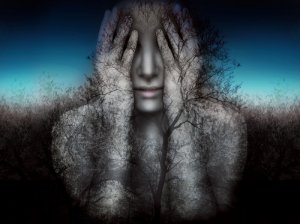Suffering Doesn't Make You a Better Person

All of my pain will be rewarded. Life will put everyone in their place, especially the people who have betrayed me. I have to suffer because this is how I will be rewarded someday. Maybe now I’m not enjoying life, but one day that opportunity will come, because the universe, or God, knows about all the bad things that have happened. Suffering is useful, because good people suffer and they’re the ones who win in the end.
Do the above sentences sound familiar to you? They’re part of a public discourse that’s been repeated for years. It’s so popular that I’m sure we’ve all been tempted by it at some point, or even adopted it as our own point of view. It’s the belief that happiness will be a reward for your suffering, not for the friendly and proactive actions that you take. It’s the emotional inheritance of our Judeo-Christian roots. Good people suffer, for themselves and for others.
In the field of clinical psychology, there’s a large percentage of depressive patients who are influenced by this irrational idea in everything they do. This is known as Heaven’s Reward Fallacy, which is the belief that your good actions will be rewarded by a magical and irrational agent.
Your actions are more powerful than “karma”
Don’t wait for opportunities; create them, take advantage of them, and get the most out of them. This requires tenacity, self-determination, and firmness. In life, you have to set limits on the abuse that others commit against you and that you inflict upon yourself.
Pain and discouragement are a part of life, and accepting them as such will improve your emotional health. You’ll know how to deal with them and confront them so that they don’t become chronic and dysfunctional. However, sometimes we adopt suffering as an authentic way of life.

We settle for complaining and victimization because we believe life did not fulfill the principle of reciprocity. We give a hug, and life returns with a punch. As if life were at the mercy of our desires, as if life were not a source of unpredictable and arbitrary events with its own strange, indecipherable laws.
If karma were really more powerful than our own just and correct actions, then people who constantly caused harm and manipulated would suffer as much as the people who received that harm, not the other way around. You just have to look around to notice that the world is far from just, far from rewarding those who suffer. So then, how should you act?
Maturity Is When You Don’t Need to Blame Others for Your Problems
Suffering doesn’t necessarily make you stronger
Thinking that life will give you all the good things you need and deserve if you suffer is like thinking that you can buy things with paper if you call it money. This is a deluded and destructive belief that we impose on ourselves, as if suffering were a blessing.
Many people get nervous when things are calm and going really well. They’re in a constant state of alertness and dissatisfaction, as if this attitude would bring them more benefits. As if constantly thinking about the bad things that could happen would bring more happiness in the future.
“We have to be suffering, sensitive, we forgive critical thinking and satire very little. We’re made to suffer and commiserate with others and be pious. And suffering does not make us stronger, rather it usually weakens us. Just like poverty, which, instead of provoking righteous anger, resentment, or the spirit of revolution, just makes us weaker and takes away our strength and capacity to react.”
-Marta Sanz-

The systemic perspective of psychology analyzes how deep-seated this way of thinking and acting is. Often, its roots are found in messages within the family. Punishment teaches children nothing if it’s not accompanied by a restorative or positive practice.
The child should understand that to remedy something they did wrong, they have to repair the damage they caused or do something positive to compensate for it. Such compensation should be immediate and contingent upon the undesirable behavior. If they’re simply punished to make them suffer, they’ll learn that the reparation of harm lies in the endurance of the suffering brought on by punishment. From a young age, we internalize that suffering passively is the correct thing to do.
Substitute self-punishment for valuable actions
If you want something better in your life, utilize the strategies and abilities that you have to make it happen. Sitting and waiting for the world to recognize your pain and reward you for it is misguided.
Depression is often based on the sensation of learned helplessness: you think that nothing will improve no matter what you do, because it never has before. It’s time to think about your previous strategies. Consider whether you had a passive attitude towards your problems and threw in the towel at the slightest difficulty, or whether you confronted your problems actively.
Suffering tends to attract more suffering. It’s a matter of paralysis. It weakens your immune system, which loses the energy to confront situations of real danger, because you’re constantly in a state of alert, distrust, and tension.
If you want to improve or heal the inner pain that you’re feeling, don’t wait to be rewarded just because you were going through a hard time. If you want support, you have to go out and find it. Sadness and inactivity are addictive. Stop suffering. It doesn’t make you a better person, it just creates pain for you and your loved ones.
This text is provided for informational purposes only and does not replace consultation with a professional. If in doubt, consult your specialist.








